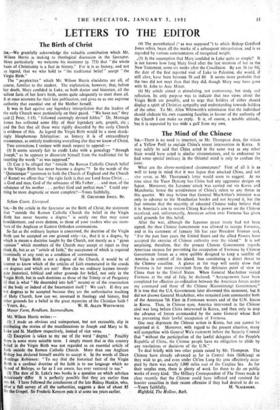The Mind of the Chinese
Sta.—There is no need to resurrect, as Mr. Thompson does, the vision of a Yellow Peril to explain China's recent intervention in Korea. It may safely be said that China acted in the same way as any other State would have acted in similar circumstances, and to endeavour to find some special intricacy in the Oriental mind is only to confuse the issue.
What are the above-mentioned circumstances? First of all it is as well to keep in mind that it was Japan that attacked China, and not vice versa, as Mr. Thompson's letter would seem to suggest. At no time since the Yuan Dynasty has China had any aggressive designs on Japan. Moreover, the Japanese' attack was carried out via Korea and Manchuria; hence the sensitiveness of China's rulers to any threat in this quarter. We may believe that General MacArthur's intention was only to advance to the Manchurian border and not beyond it, but the fact remains that the majority of educated Chinese today believe that it is America's aim to restore Chiang Kai-shek to power on the Chinese mainland, and, unfortunately, American action over Formosa has given solid grounds for this belief.
After the war, although the Japanese peace treaty had not been signed, the then Chinese Government was allowed to occupy Formosa, and in his statement of January 5th last year President Truman said, " For the past four years the United States and the allied Powers have accepted the exercise of Chinese authority over the island." It is not surprising, therefore, that the present Chinese Government regards American excuses for preventing the occupation of Formosa by Chinese Government forces as a mere quibble designed to keep a satellite of America in control of the island, thus constituting a direct threat to the Chinese coastline. A glance at the map will surely show the( Formosa is far more important from the defensive point of view to China than to the United States. When General MacArthur visited Formosa at the end of July, he declared, " Arrangements have been completed for effective co-ordination between the American forces under my command and those of the Chinese (Kuomintang) Government." It is true that the US. Government later disowned this statement, but it did not disown General MacArthur, who remained joint commander both of the American 7th Fleet in Formosan waters and of the U.N. forces in Korea. Thus, in Chinese eyes, America intervened in the Chinese civil war long before China intervened in Korea, and then only to stop the advance of forces commanded by the same General whose fleet was preventing their lawful occupation of Formosa.
One may deprecate the Chinese action in Korea, but one cannot be surprised at it. Moreover, with regard to the present situation, many will sympathise with General Wu's statement before the Security Council that " without the participation of the lawful delegates of the People's Republic of China, the Chinese people have no obligation to abide by any resolutions or decisions of the U.N."
To deal briefly with two other points raised by Mr. Thompson. The Chinese have already advanced as far in Central Asia (Sidkiang) as they wish to go, and even under Ch'ien Lung the area effectively occu- pied by them was nearly 1,000 miles east of the Caspian Sea. As for their surplus men, there is plenty of work for these to do on public works of every kind. The Military Correspondent of The Times made it clear recently that the Chinese could have inflicted and received lar heavier casualties in their recent offensive if they had desired to do so.






































 Previous page
Previous page